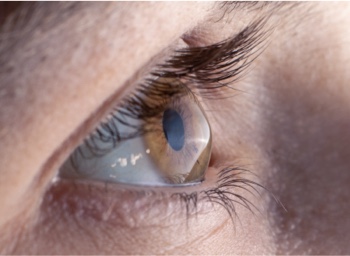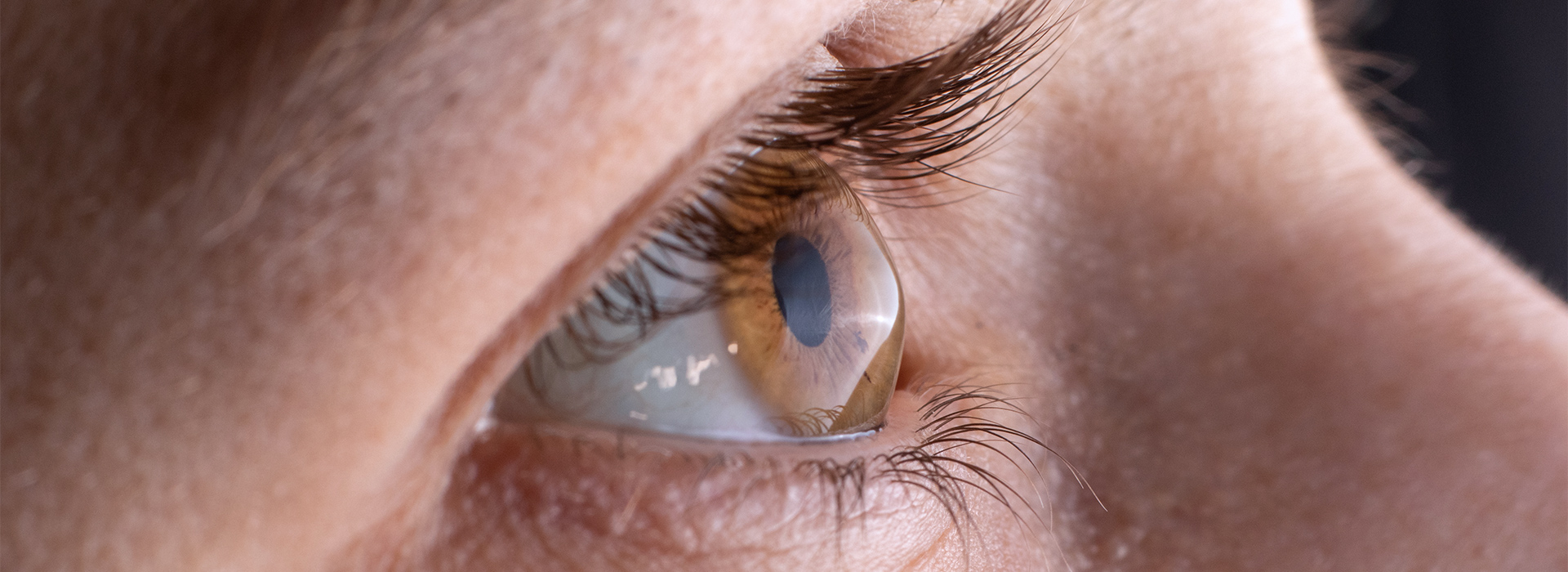
Common Eye Problems, Diseases, & Treatments
Did you know that some eye diseases, including age-related macular degeneration and glaucoma, don’t show any symptoms until the disease has progressed to a more serious point? By staying informed on potential eye problems, keeping up with your regular eye exams, and choosing an optometry practice where you feel comfortable asking all of your questions, you’re protecting your vision for the long term.
Read on for more information on eye diseases and problems, including age-related macular degeneration, cataracts, glaucoma, conjunctivitis (pink or red-eye), and flashes and floaters. Remember, if you’re concerned about new vision symptoms, you do not have to wait until your next scheduled eye exam.
Contact us to book an appointment as soon as possible to discuss your new symptoms.



Age-related Macular Degeneration (AMD)
Age-related macular degeneration (or AMD) is the leading cause of vision loss in Canada for adults over 55. It often develops slowly. In fact, you likely won’t notice any symptoms at all in the earliest stages, but a routine eye exam can detect AMD before you start to experience any blurred vision. We use optical coherence tomography (OCT) lasers to scan your retinas for early signs of the disease.
Ages 18–64
The CAO recommends that adults between the ages of 18 and 64 should have an eye exam at least once every 2 years if they aren’t at risk of developing an eye disease or condition.
Ages 65+
Seniors over the age of 65 should have eye exams annually if they aren’t at risk of developing an eye issue. Seniors are more likely to develop age-related diseases like macular degeneration, so it’s important to attend eye exams to diagnose these problems early.
Are You at Risk?
You may need more frequent eye exams if your eyes are at risk of developing problems that could affect your vision or eye health. You may be at risk if:
- You have a family history of eye health problems
- You have medical issues related to eye conditions
- You take medications with ocular side effects
- You have had eye surgery
- You have had an eye injury

Cataracts
Cataracts are a remarkably common issue among adults over the age of 60. In fact, almost every adult will experience some sort of cataract development by the time they turn 65.
Your eye’s natural lens yellows with age and sun exposure. This results in dim, blurry vision and duller colours, like looking through a dirty window. Cataracts can form slowly, over several years, or as quickly as a few months.
Symptoms of Cataracts
When cataracts first develop, you likely won’t notice much change. But as they progress, you’ll probably start to find your vision seems cloudy. Other symptoms of cataracts include:
- Blurry or foggy vision
- Decreased night vision
- Halos around lights at night
- Colours appear dull or muted
- A film over your eye that doesn’t go away with blinking
- Sunlight or other light seems bright or glaring
Cataract Treatment
In the early stages of cataracts, your eye doctor may be able to provide you an updated lens prescription to help you see as clearly as possible. Eventually, though, your best option may be cataract surgery.
Cataract surgery is a quick, extremely effective procedure. Patients typically notice the return of clarity and colour intensity in just a few days. The surgery is done one eye at a time, and only takes about 10 minutes per eye.
Cataract Assessment
If you’d like to be assessed for cataracts, please book an appointment with us today. We can tell you more about the surgery and assess your overall eye health. We’ll happily answer all your questions and take the time to make sure you understand everything we’ve covered.

Glaucoma
Nearly 300,000 Canadians live with blindness due to glaucoma. It’s one of the farthest-reaching and most serious diseases in the world. In most cases, glaucoma presents no symptoms, working silently behind the scenes to irreversibly damage your eyes.
If glaucoma is caught early, it can usually be treated and controlled, preventing significant vision loss. The only way to catch glaucoma early is through routine eye exams.
Testing for Glaucoma
Every In Focus Eyecare exam includes glaucoma testing. We use optical coherence tomography (OCT) to take high-resolution pictures of your eyes to assess and monitor for glaucoma. We’ll carefully look for any signs that might indicate glaucoma and give you a full explanation of your results.
We want you to feel confident in your eye health, so we take the time to answer your questions and put your concerns to rest as best we can. Your appointment isn’t over until you can walk out feeling like you understand the state of your eye health.
Glaucoma Treatments
Unfortunately, the damage from glaucoma is irreversible, but when caught early, treatment can help maintain your vision.
The most common glaucoma treatment today is selective laser treatment. Eye drops are still also very common, too. When lasers and drops don’t work, there are a number of advanced surgical treatments to effectively lower the eye pressure.

Conjunctivitis (Pink Eye)
Conjunctivitis, also known as pink eye, is a common eye infection that affects adults and children alike. There are different types of conjunctivitis, each with its own cause and symptoms.
Conjunctivitis is an inflammation of the conjunctiva, the mucous membrane that covers the white surface of the eye. Some forms of conjunctivitis will clear up on their own, while others need medical care. It’s important to know how to spot the differences so you know when it’s time to get help.
If you have any questions about conjunctivitis or other eye health issues, contact us. We’ll happily take the time to give you some answers and look into the health of your eyes.

Conjunctivitis Types, Symptoms, & Treatments
Allergic Conjunctivitis
Allergic conjunctivitis generally affects both eyes, causing itching, watering, redness, and swelling. Lots of patients also experience white stringy discharge and find their eyes are particularly sensitive to light. The skin around the eyes may start to swell and become puffy. Allergic conjunctivitis sometimes shows up alongside other allergic reactions like hives or nasal congestion.
Antihistamines or allergy medication are your best bet for treating any kind of allergic reaction once it starts. You could also try to avoid the reaction altogether by removing the allergen from your environment. Your eye doctor at In Focus Eyecare can prescribe medicated drops to help limit and reduce your symptoms.
Viral Conjunctivitis
Viral conjunctivitis usually starts in one eye, but it can quickly spread to the other due to its infectious nature. Along with the redness and itching of other conjunctivitis strains, it can also cause blurry vision, sensitivity to light, excessive tears and discharge. Viral conjunctivitis is highly infectious.
Unfortunately, most types of viral conjunctivitis usually have to run their course; antibiotics do not affect viruses. This means you’ll have to take it easy and let your body fight off the infection. However, some viruses can attack your cornea and need urgent care.
We recommend you come in for an official diagnosis just to be safe. Then, stay out of public spaces to avoid spreading the infection. It’s also a good idea to wash all your pillowcases and throw out any cosmetics you’ve used on the infected eye. This helps prevent infecting your healthy eye.
Bacterial Conjunctivitis
An eye infected with bacteria usually becomes more red than pink, and is swollen and sore. Many patients experience itching or burning along with tearing and foreign body sensation. Bacterial conjunctivitis usually produces a thick and sticky yellow or green discharge. This discharge can be so heavy that the patient will wake up in the morning with their eye sealed shut.
Bacterial conjunctivitis requires antibiotics. You’ll have to visit your eye doctor and have them prescribe a medication. Once you’ve been diagnosed and given your medication, you’ll need to avoid heavily populated areas as much as possible to keep from spreading the infection. You’ll also need to wash all your bedding and throw out any cosmetics you’ve used on the infected eye.
Other Eye Infections
Infection and inflammation can affect the white part of your eye (scleritis), the conjunctiva (conjunctivitis), or the clear dome over your iris (keratitis). All infections can have similar symptoms, but corneal infections can be sight-threatening.
If your eyes are sore, red, and discharging sticky tears or mucus, request an emergency eye care appointment. One of our doctors will expertly assess, diagnose, and manage your problem.

Flashes & Floaters
While most of us have experienced random floating shapes or flashes of light in our vision, it’s typical to brush them off as merely strange and carry on with our day. But what if flashes and floaters are your body’s way of telling you something is wrong?
When Are Flashes & Floaters a Problem?
As a general rule, any time your vision changes suddenly, you should see your optometrist as soon as possible. If you’re experiencing flashes of light or veils that come in waves or patterns, something is most likely wrong, and you should seek immediate emergency care.
Floaters can come in many sizes and shapes. Any change in the number or frequency of your floaters could indicate a problem. If you experience waves of flashes in conjunction with what appears to be a downward shower of floaters, your retina may be detaching and will need immediate medical attention.
What Is a Flash?
Because the retina is so sensitive, it’s easily stimulated. Usually, light stimulates it, causing it to send messages through the optic nerve to the brain, where it’s interpreted as an image.
When something jerks, jostles, or touches the retina, it’s stimulated to do the same thing. It sends an impulse through the optic nerve, which your brain then interprets as a flash of light. This can happen from a blow to the head, a sudden stop, or the vitreous in your eye retreating due to age.
Any new flashes can be a sign of a retinal tear and need urgent attention. You should always get medical help after a head injury, as an undiagnosed concussion can lead to serious problems.
What Is a Floater?
The inside of your eye is filled with a substance called the vitreous. When you’re born, the vitreous is like a gel. But as you age, the vitreous dissolves into more of a liquid. Commonly, the dissolution process doesn’t happen evenly, leaving pieces of vitreous gel floating in the liquid.
These little floating shapes may simply be shadows of the floating pieces of gel. Alternatively and more seriously, a new floater could be a piece of the retina that has broken away, leaving a retinal hole in its place.
Retinal holes can progress to retinal detachments, which can be blinding. Retinal holes can be stabilized to prevent progression with lasers. If you have new floaters, call our office immediately or seek emergency care.
Retinal Detachment
The retina (the lining on the back of your eye) is extremely sensitive and is a crucial part of the visual system, detecting light and sending messages to the brain.
When the retina tears or detaches, it can be a vision-threatening problem. While it can be fixed, the longer the retina is detached, the less likely your vision will be fully restored. If you think you’re experiencing retinal detachment, don’t wait.
Call us to get emergency medical help right away.

Our Services

Adult & Senior Eye Exams

TempSure Skin Tightening

Myopia Control

Dry Eye Exams

Macular Degeneration

EnChroma


Where To Find Us
Sarnia – Lakeshore Road
- 519-542-3937
- (519) 542-2800
- 1206 Lakeshore Road
- Sarnia, ON N7S 2L2
Hours
- Monday: 8:00 AM – 5:00 PM
- Tuesday: 9:00 AM – 5:00 PM
- Wednesday: 8:00 AM – 5:00 PM
- Thursday: 8:00 AM – 5:00 PM
- Friday: 8:00 AM – 5:00 PM
- Saturday: Closed
- Sunday: Closed
Sarnia – Vidal Street
- (519) 336-4113
- (519) 336-1639
- 120 Vidal Street North
- Sarnia, ON N7T 5X5
Hours
- Monday: 8:00 AM – 5:00 PM
- Tuesday: 9:00 AM – 5:00 PM
- Wednesday: 8:00 AM – 5:00 PM
- Thursday: Closed
- Friday: 8:00 AM – 5:00 AM
- Saturday: Closed
- Sunday: Closed
Grand Bend
- (519) 238-6086
- (519) 238-6068
- 43 Main Street East
- Grand Bend, ON N0M 1T0
Hours
- Monday: 9:00 AM – 5:00 PM
- Tuesday: 9:00 AM – 5:00 PM
- Wednesday: 9:00 AM – 5:00 PM
- Thursday: 9:00 AM – 5:00 PM
- Friday: 9:00 AM – 5:00 PM
- Saturday: Closed
- Sunday: Closed


Our Brands












